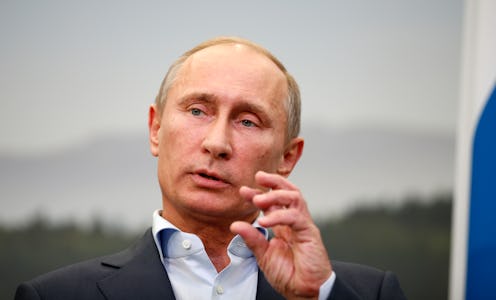News
Was Obama Right To Cancel on Putin?
While President Obama will still attend the G20 summit in St. Petersburg this September, he won’t meet one-on-one with Russian President Vladimir Putin during his visit, the White House announced Wednesday.
The diss, according to the White House, is ostensibly due to a lack of "enough recent progress in our bilateral agenda with Russia." However, there’s a widespread presumption that Putin’s decision to grant asylum to NSA leaker and American dissident Edward Snowden may have influenced Obama's decision.
The Christian Science Monitor pushed back against this common wisdom today, with the editorial board writing that the U.S. and Russia have long been facing disagreements on “on a host of values important to the U.S. and indeed much of the world.” Nuclear nonproliferation, free-trade pacts, the Syrian civil war and human rights in Russia have all divided the two nations; the Snowden asylum is just the latest drop in the bucket.
But was canceling the summit meeting the right course? Leon Aron, director of Russian studies at the American Enterprise Institute, thinks not. While Russian state-run media probably won’t report on the fact that Obama canceled his one-on-one meeting with Putin, it will give coverage to Obama’s mere willingness to attend the meeting — itself an event that, in the eyes of the Russian people, legitimizes Russia’s world standing and, by extension, that of the Putin regime.
“Thus the White House’s generally correct message — Russian domestic behavior is now not without costs for U.S.-Russian relations — is likely to be wasted on the Russian people and the world audience alike,” Aron writes.
Fox News’ Matthew Dunn agrees, stressing the need for diplomacy between the two nations and calling the snub “petulant, and potentially dangerous.”
“If Putin really wanted to antagonize Obama, he’d have given Snowden unconditional asylum,” says Dunn. “Instead, he’s stuck a finger up to Obama but at the same time done the bare minimum for Snowden while allowing doors to remain open for future bilateral talks between America and Russia. Obama and his administration should have realized that, and attended the Moscow summit.”
John Bolton, former UN Ambassador under George W. Bush, agrees the White House made the wrong decision — but only because it didn’t go far enough in punishing Putin.
“It's a diplomatic equivalent of fluttering your eyelids," Bolton told USA Today. "Russia has caused us real pain with Snowden and the United States should cause them real pain.” He went on to explain that “real pain” would take the form of canceling the trip to Russia entirely, or perhaps reviving plans to built a missile defense system in nearby Poland.
Bolton might find some common ground with the Contra Costa Times Editorial Board, which penned a glowing endorsement of the Putin snub.
“We applaud President Barack Obama on his decision not to meet with thug-in-chief Vladimir Putin in September,” the editors wrote. “If anything, Obama shouldn't have simply canceled the one-on-one talk, he should have gone on national television and torn up the invitation.”
One person who’s undoubtedly pleased with the announcement is Democratic Senator Chuck Schumer, who likened Putin to a “schoolyard bully” and urged Obama to cancel on him three days ago.
“I’ve learned that unless you stand up to that bully, they ask for more and more and more,” Schumer said.
The entire issue is a moot point to Andrew Weiss, a former Russia expert in the Clinton Administration. He says that American politicians fail to grasp “how little we matter to Russian leadership,” stressing that Putin and company care more about their relationships in Europe and China.
"That's a big part of the reason why there's so much enthusiasm in Russian political circles for America bashing and being more competitive with the United States,” Weiss says. “The relationship doesn't matter that much to them.”
